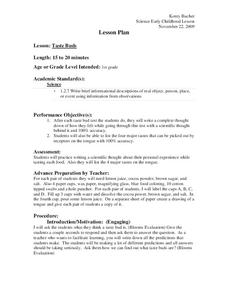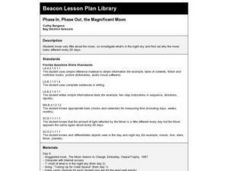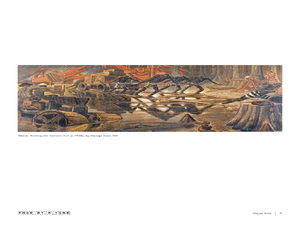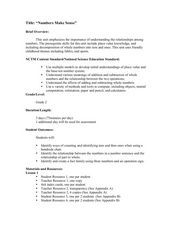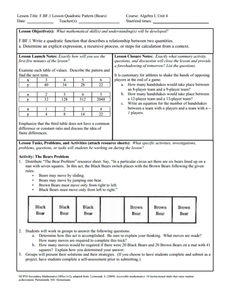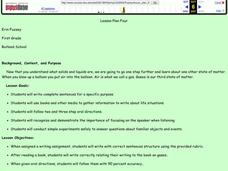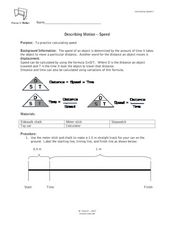Curated OER
Mystery of Mirrors: Discovery Stations
Hands-on stations in which groups of primary learners experience what mirrors can do provide opportunities for experimenting and authentic discovery. Recording their observations in complete sentences seems age-inappropriate. Drawing...
Curated OER
Measure Object Using English and Metric Systems
Students are able to measure various objects using English and metric systems within half of the smallest unit of the measurement device. Students identify units of length, volume, mass and temperature according to International System...
Curated OER
Bouncing Bubbles
Students complete a variety of activities exploring the joys and science of bubbles. They listen to the book "Bubbles Bubbles" by Mercer Mayer, create a bubble picture using Kid Pix, and explore blowing bubbles. Students experiment...
Curated OER
To Float or Not to Float, That is the Question?
Ninth graders develop operational definition of density, do computations using density equation, categorize pieces of matter as being able to float on
water or not, based on density, explain why some objects sink or float based on...
Curated OER
Sunny Delight
First graders explore completing experiments through the scientific method.
Curated OER
Magnets
Students complete a series of experiments using magnets. In this physical science and magnetism lesson, students first predict and test the magnetic properties of various objects, then students determine if the size of a magnet impacts...
Pennsylvania Department of Education
Equal Groups
Students explore statistics by completing a graphing activity. In this data analysis instructional activity, students define a list of mathematical vocabulary terms before unpacking a box of raisins. Students utilize the raisins to plot...
Curated OER
Review of the Five Senses
Students investigate the five senses. In this human biology lesson, students are given five items and identify which items match best with each of the senses. Students use objects such as a rock, hard candy, and a flower.
Curated OER
Taste Buds
First graders taste a variety of items and record a full sentence about the way they taste. In this taste buds lesson, 1st graders predict and then taste various items. Students draw a picture of the tongue and show the part...
Curated OER
Up in the Sky
First graders associate events and objects with day or night. They create a word bank and use is as a reference to create sentences about the sun. They conduct sun-themed experiments and art projects.
Curated OER
Phase In, Phase Out, the Magnificent Moon
First graders discuss why the moon appears to change shape. They use flashlights and balls to simulate the sun's light shining on the moon during its different phases. They read books, paint pictures and write sentences about the moon.
Curated OER
Magnifiers
Students describe how several different objects magnify a provided sentence and decide if they are good magnifiers or not. They then write a sentence describing two properties an object must have in order to be a good magnifier.
Curated OER
Incredible Seeds
Second graders are given a group of seeds and put in small groups. They classify their seeds based on their observations with 90% accuracy. Students draw a picture of each seed showing at least 2 characteristics of each. They write 1...
Curated OER
Analyzing Visual Symbols
Students analyze and identify visual symbols in everyday life and during a museum visit. In this visual symbol lesson plan, students study associated vocabulary such as analyze and interpret. They find and note attention getting symbols...
Pennsylvania Department of Education
Determine Volume of Solids Using Water Displacement
Students explore math functions by completing math equation worksheets. In this inequality lesson, students define a list of math terms and discuss the difference between an equation and inequality. Students utilize a real life situation...
Curated OER
Activity Plan 5-6: Searching for Shapes
Students explore the shapes all around them. In this early childhood lesson plan, students use their creative thinking skills to compare shapes to the form ob objects in their classroom.
Curated OER
Numbers Make Sense
Second graders explore number values by completing estimation problems in class. In this place value lesson, 2nd graders identify the use of decimals in numbers and how they relate to fractions or parts of a whole. Students utilize flash...
Curated OER
It's Alive
Students identify the differences between a nonliving and living thing. They describe what is needed for any living thing to survive. They create one page for the class book identifying why the object is a living thing.
Curated OER
Astrolabe Activity
Students study how to use an astrolabe, define terms and understand the relationship between angle and altitude. In this astrolabe lesson students complete an activity, record their measurements and complete a handout.
Curated OER
Bears
Students complete a variety of bear-related activities. They sort and graph teddy bears, distinguish between real and non-real bears and research bear life cycles and habitats.
Curated OER
Matter
First graders are read a story about the various stages of matter with a focus on gases. Using a ziploc bag, they capture as much air as possible and discuss how it takes up space even though it is invisible. To end the lesson, they blow...
Curated OER
Children Around The World
Students read a multicultural book called "This Is the Way We Go to School" by Edith Baer and Steve Bjorhman. They become culturally aware of the different nationalities around the world and different ways that they may do things on a...
Curated OER
Describing Motion-Speed
Learners study speed and learn how to calculate it. In this investigative lesson students participate in an activity that shows them how to calculate speed then they fill out a worksheet.
Curated OER
Finding Their New World
First graders place stickers on maps indicating their understanding of the cardinal directions. They locate Jamestown, England, the Atlantic, and Virginia.








